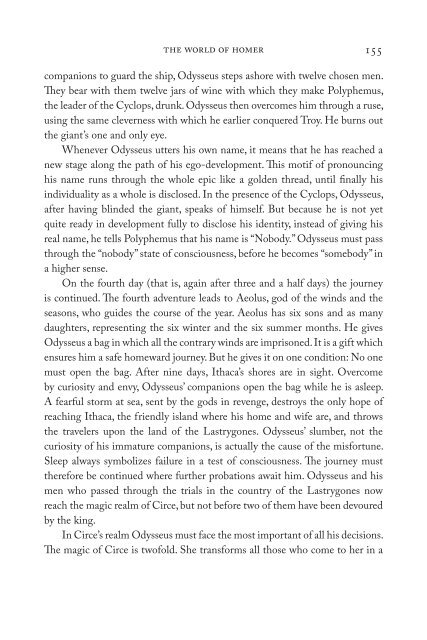The Gospel of Hellas - Research Institute for Waldorf Education
The Gospel of Hellas - Research Institute for Waldorf Education
The Gospel of Hellas - Research Institute for Waldorf Education
Create successful ePaper yourself
Turn your PDF publications into a flip-book with our unique Google optimized e-Paper software.
the world <strong>of</strong> homer<br />
companions to guard the ship, Odysseus steps ashore with twelve chosen men.<br />
<strong>The</strong>y bear with them twelve jars <strong>of</strong> wine with which they make Polyphemus,<br />
the leader <strong>of</strong> the Cyclops, drunk. Odysseus then overcomes him through a ruse,<br />
using the same cleverness with which he earlier conquered Troy. He burns out<br />
the giant’s one and only eye.<br />
Whenever Odysseus utters his own name, it means that he has reached a<br />
new stage along the path <strong>of</strong> his ego-development. This motif <strong>of</strong> pronouncing<br />
his name runs through the whole epic like a golden thread, until finally his<br />
individuality as a whole is disclosed. In the presence <strong>of</strong> the Cyclops, Odysseus,<br />
after having blinded the giant, speaks <strong>of</strong> himself. But because he is not yet<br />
quite ready in development fully to disclose his identity, instead <strong>of</strong> giving his<br />
real name, he tells Polyphemus that his name is “Nobody.” Odysseus must pass<br />
through the “nobody” state <strong>of</strong> consciousness, be<strong>for</strong>e he becomes “somebody” in<br />
a higher sense.<br />
On the fourth day (that is, again after three and a half days) the journey<br />
is continued. <strong>The</strong> fourth adventure leads to Aeolus, god <strong>of</strong> the winds and the<br />
seasons, who guides the course <strong>of</strong> the year. Aeolus has six sons and as many<br />
daughters, representing the six winter and the six summer months. He gives<br />
Odysseus a bag in which all the contrary winds are imprisoned. It is a gift which<br />
ensures him a safe homeward journey. But he gives it on one condition: No one<br />
must open the bag. After nine days, Ithaca’s shores are in sight. Overcome<br />
by curiosity and envy, Odysseus’ companions open the bag while he is asleep.<br />
A fearful storm at sea, sent by the gods in revenge, destroys the only hope <strong>of</strong><br />
reaching Ithaca, the friendly island where his home and wife are, and throws<br />
the travelers upon the land <strong>of</strong> the Lastrygones. Odysseus’ slumber, not the<br />
curiosity <strong>of</strong> his immature companions, is actually the cause <strong>of</strong> the mis<strong>for</strong>tune.<br />
Sleep always symbolizes failure in a test <strong>of</strong> consciousness. <strong>The</strong> journey must<br />
there<strong>for</strong>e be continued where further probations await him. Odysseus and his<br />
men who passed through the trials in the country <strong>of</strong> the Lastrygones now<br />
reach the magic realm <strong>of</strong> Circe, but not be<strong>for</strong>e two <strong>of</strong> them have been devoured<br />
by the king.<br />
In Circe’s realm Odysseus must face the most important <strong>of</strong> all his decisions.<br />
<strong>The</strong> magic <strong>of</strong> Circe is tw<strong>of</strong>old. She trans<strong>for</strong>ms all those who come to her in a

















